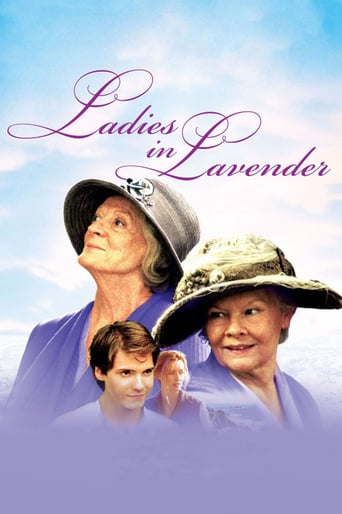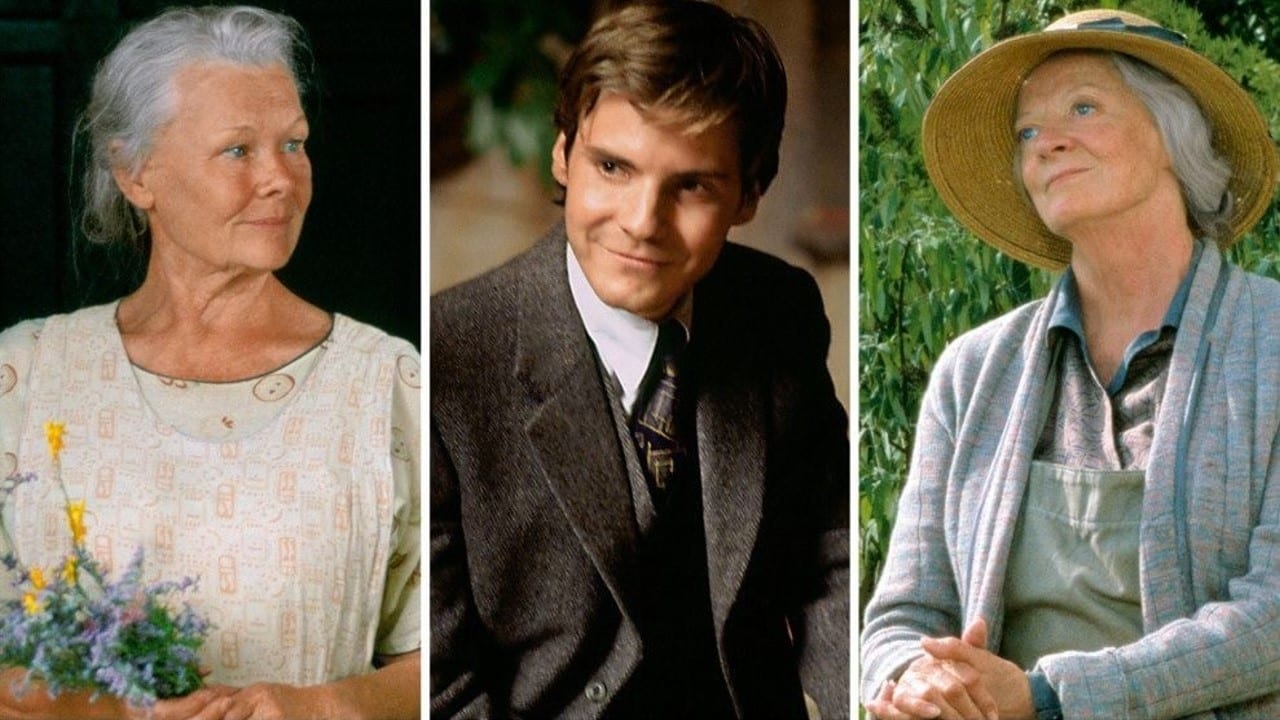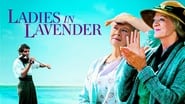SimonJack
How fitting for a film of late life to have two of England's leading actresses of the second half of the 20th century. And, two of the very best actresses of all time. Judi Dench and Maggie Smith star as Ursula and Janet, sisters who are living together in old age. Janet had lost her husband in World War I, and Ursula never had married. The film is based on a short story by British author William Locke. It takes place in 1936, along the Cornwall Coast of England. The ladies have a cook and housekeeper, Dorcas (played by Miriam Margolyes). A young man comes into their lives when the sister one morning spot him lying just above the waves in the sandy alcove below their cottage. He has a broken ankle, but is alive. With the help of some villagers they carry him to their home and send for the doctor. When he awakens, Andrea (Daniel Brühl) doesn't speak English. The sisters nurse him back to health and with dictionaries and bits of German they communicate with him. They learn that he is from Poland and was on his way to America on a ship when he was washed overboard. Andrea is soon endeared to the village when it's discovered that he plays the violin masterfully. Other people contribute to the story. Dr. Francis Mead is the local country doctor who has been a widower for some time. Olga Daniloff is a young Russia woman who is on holiday in Cornwall to paint its beautiful coastal scenery. The doctor is attracted to her, but she isn't attracted to this much older man. Olga speaks German and soon meets and talks with Daniel. Her brother is a famous violinist and this leads to a beautiful ending for the film. This is a wonderful drama of life with an exciting adventure out of the ordinary that adds spark to the routine of two elderly sisters. Smith and Dench have more than 90 major film and acting award nominations. Of 93 Academy Award, Golden Globe, BAFTA and Emmy nominations, they won 27. And, each also won a Tony on Broadway as best actress in a play. Their cumulative record of major film awards includes 3 Oscars and 10 more nominations, 5 Golden Globes and 19 more nominations, 15 BAFTA awards and 29 more nominations, and 4 Emmy's and 8 more nominations. The awards between the two actresses are nearly even. Smith has 14 wins and 32 more nominations, and Dench has 13 wins and 34 more nominations. Smith's wins include 2 Oscars, 3 Golden Globes, 5 BAFTAs and 4 Emmy's. Dench has won 1 Oscar, 2 Golden Globes, and 10 BAFTA awards. December 1934 was a bright month for English film and stage. Both women were born that month - Dench on Dec. 9 and Smith on Dec. 28. In his 2004 film, they play senior women in the year of their real 70th birthdays.
dara-fink
Charles Dance (Tywin Lannister from Game of Thrones) amply demonstrates that he understands how to tell a great story. There are no tense action sequences to drag missing plot elements along. Just a well told story masterfully acted by (arguably) some of the best female actors in cinema history.One surprising element is how music seamlessly integrates into the narrative. Although the person performing the pieces isn't actually playing, the illusion is good enough.For people with very short attention spans or requiring fast paced action, this film just isn't for you. This is no action flick. It is a charming story of how a chance house guest changes the lives of the sisters and their town.For anyone wanting a quiet evening of even-paced, masterfully acted, work of film: it is a sure bet.
Leofwine_draca
A true labour of love for writer/director Charles Dance, LADIES IN LAVENDER is a low key historical romance that explores an unusual love triangle that takes in pre-WW2 Cornwall. It's one of those films that's all about feelings and subtlety, so although there's virtually nothing in the way of on-screen action, it gets across a mood and feeling to be sufficiently watchable.A couple of lonely spinsters have their lives put into disarray when a young German is washed up on their beach, badly injured. He recuperates at their home, where one of them soon falls in love with him and convinces the other that he's Polish rather than German. Meanwhile, the arrival of a Russian girl in the village spells further trouble...The first half of this film brings to light a kind of wistful, nostalgic atmosphere for forgotten times when things were simpler. Judi Dench and Maggie Smith play to type, but both are good when they get to the heart and humanise their characters in later scenes. Dance's hands-off direction allows the story to play itself out at a leisurely pace, and I admit that I was gently enthralled. Daniel Bruhl (INGLOURIOUS BASTERDS) is a nice choice to play the German character. Later, attempts at intrigue with the Natasha McElhone character - as pretty as she is - don't really go anywhere and the plot falters a little. Still, the music scenes are delightful and at least the story never betrays itself, even if the ending is rather slight.
johnnyboyz
Chances are Ladies in Lavender will remind you of that sweetly played Michael Radford film from the mid-90s entitled The Postman; later known only as "Il Postino", in its original language, at the expense of a later Kevin Costner film of the same name. Like Il Postino, Ladies in Lavender is a period piece, set around about the same time as Radford's film, which zeroes in on a sleepy coastal town and a specific inhabitant whose life has been somewhat bereft of incident, let alone incident with the opposite sex, and often, we feel, sheltered. Amidst the town's more animated activity, that being limited to fishing and only fishing, a younger member of the other gender crash lands into the laps of our lead; their beauty prominent, their allusive qualities more than evident and their presence later shattering. As either films progress, we will come to watch this lead go on to both interact as well as advance the nature of their feelings for the previously exterior individual; thus leading to all sorts of complications to do with lust and anger which lead to overwhelming residing sentiments.The film follows that of Judi Dench's Ursula, an elderly woman living in a Cornish town with her sister Janet – played by the seemingly ever-consummate Maggie Smith. This pairing live in the sort of place in which local residents are able to recall what people looked like nigh-on forty years ago, the sense of those born in the area not necessarily going anywhere during their lives that is particularly far away from the area, prominent. We open on them with this quaint, blissful sentiment to proceedings; the duo messing about on a beach during a clear summer evening establishing real degrees of closeness and a sense of very little strife, or indeed, issue, currently between them - even at this late stage in either of their lives. Whilst on the beach, Janet appears willing to have a brief paddle in the lapping sea; Ursula's natural reaction to dismiss such an idea, through being afraid of it or whatever, sees her hold back as the sibling makes the proverbial step forward to get involved, thus an instance is an early highlighting of either women's nature and the dynamic of their relationship therein.Further sentiments of these sisters being as close as they are reside when we realise they share a bedroom housing two single beds, in spite of the fact the house is clearly big enough for the pair of them. Janet's side-table houses a photograph of a younger man dressed as a soldier, and is most probably her husband; then we observe that Ursula's side-table is vacant of such things, inferring a lack of prior masculine presence in her life. As a pairing, we observe Janet dismissing a "populist" radio show Ursula enjoys listening to; Janet spends the free time they have reading, whereas Ursula can only knit and when it comes to starting up their motor-vehicle to go out, Janet must again drive proceedings as she cranks it up and gets it going before taking them both out. Culturally, and in terms of exposure to life and whatnot, Janet appears indelibly more advanced than her sister; brief establishments that go a long way to tee up what will be Ursula's tale of having to come to terms with certain feelings and drive a strand of her own that will go against this established patriarchy.Where we come to sense few ever get out, and that sense of the whole place being entirely tied in to one another in that community driven way some places are, we sense the film's catalyst arriving in the form of a young man washed up on the nearby shore through Daniel Brühl's Andrea could be quite the occasion. Upon first seeing him, and the consequent interactions thereafter, Janet's busy physical demeanour as someone trying to aid and take care of him is in stark contrast to Ursula's stilted, far more stunned complexion; she reacts as if not having seen one of his kind in her entire life, even doing so a fair time after the initial shock of finding someone with the potentially to be seriously injured or even dead has evaporate. The night before Andrea's inglorious arrival, they turn off their radio with the announcer on the brink of speaking of a severe storm due to hit the area – what they end up with is a more burning, more physical incarnation of this sort, particularly when Natascha McElhone manoeuvres into proceedings. McElhone plays a Russian love rival named Olga whom turns up and reveals herself to paint rather than merely knit; someone whom we enjoy observing at home, barefoot, and blowing smoke into the air from her cigarette as she sports a loose gown and sits comfortably on a chair in an extravagant looking house.The film gently constructs Ursula's gradual coming to feel for this young man, eventually revealed to be a Polish violinist. The film tiptoes between a fine line separating it from warm hearted drama and out and out tragedy; we really enjoy Dench's acting - her frail and fragile performance, as she plays this vulnerable person exposed to elements she struggles to comprehend, a wondrous performance off the back of playing that of domineering, grizzled women evident in the likes of Die Another Day and The Chronicles of Riddick: Dench flicks from one to the other remarkably. Director Charles Dance, his first and so far his only venture into directing, does a more than ample job in depicting these events and these characters; his film amongst some of the better film-making debuts from the first half of last decade, and worthy of utterance in the same breath as Romanek's One Hour Photo or Richard Kelly's Donnie Darko, in what is a fascinating drama.


 AD
AD





